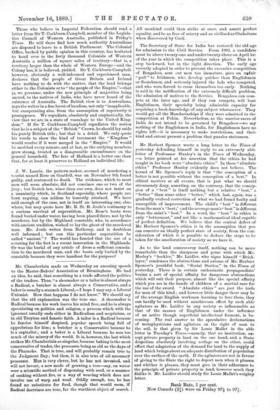As to the land controversy itself, nothing can be more
remarkable than the sharpness and point with which Mr. Morley's "heckler," Mr. Laidler, who signs himself "Brick- layer," condenses the abstractions and axioms of Mr. Herbert Spencer's youthful book, "Social Statics," in the Times of yesterday. There is in certain enthusiastic propagandists' brains a sort of special affinity for dangerous abstractions which will suit their purpose, almost like the special affinity which you see in the bands of children of a martial race for the use of the sword. "Absolute ethics" are just the tools for men of this kind ; and however little danger there may be of the average English workman learning to love them, they can hardly be used without mischievous effect by such able agitators as Mr. Laidler in any society so inflammable as that of the masses of Englishmen under the influence of an active though superficial intellectual ferment, is be- coming. The real answer to the speculative declamations of metaphysicians and agitators on the right of man to the soil, is that given by Sir Louis Mallet in the able letter in Tuesday's Times,—namely, that no institution, ex- cept private property in land on the one hand, and a State despotism absolutely involving serfage on the other, could effect that adaptation of the demand for land to the supply of land which brings about an adequate distribution of population over the surface of the earth. If the agitators are not in favour of giving to the State the right to deport men when it pleases and whither it pleases, they must give in their adherence to the principle of private property in land, however much they dislike it. Mr. Laidler should study Sir Louis Mallet's weighty letter.


















































 Previous page
Previous page